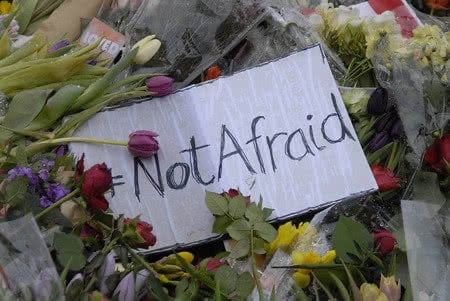Managing Anxiety After a Terror Attack

Anxiety after a terror attack is real, and can be crippling. The recent events in the news have us wondering just what exactly is our new reality?
I was nine months pregnant when Washington DC was besieged by a rampage of sniper attacks in October of 2002. Gas stations, parking lots, public parks suddenly took on new danger as 17 civilian victims were gunned down in public spaces by an attacker never seen. How were DC area residents to go about living their lives, getting to work, procuring groceries, let alone simply venturing into public when there was a chance we too could be the next victim in these brutal slayings? I remember thinking about everything differently. Every parking lot and every public space brought new trepidation. It was impossible not to wonder if I, and my infant son born that month, could be next. Terrorism influenced every decision I made, and anxiety had my guard on high alert.
Yesterday, 8 New York bikers were mowed down by a terrorist driving a rented truck. A month ago, Las Vegas concert goers were gunned down in the largest mass shooting of modern history. Once again, innocent people going about the business of everyday life targeted, and brutally killed. Anxiety following this brutal terror attack is unmistakable and real.
Somehow we must absorb these unimaginable crimes, these grave assaults against our freedom, our way of life, and most importantly, reconsider our sense of safety and control. How can we help but feel fear and anxiety as we face the painful aftermath, and future possibilities? There is no way not to feel anxiety from the news of terror. Terror’s shockwave of fear threatens our way of life, and our sense of control, from the inside. We don’t have to be a direct victim to feel the effects.
Merriam Webster defines terrorism as, “the systematic use of terror especially as a means of coercion.” Terror aimed at coercion. It simply isn’t possible not to feel terror as we bear witness to increasing atrocities targeting people just like us.
Our psyches are the front line of this new war of which we are are all victims. Confusion, fear, and powerlessness are the intended effects. Our imaginations take up the call, and bathe us in traumatic empathy and fears of possibilities.
Terror feeds on itself: the more we fear, the more we avoid; the more we avoid, the more we fear. Left unchecked, it can steadily take over.
But fear doesn’t have to work this way. Despite our powerlessness over the events, we can maintain power over our minds. We can fight back against terror by refusing to let it take control.
Anxiety should drive focus and awareness, but cautious alertness must exist alongside courage and deliberateness. These four key strategies can help you manage anxiety after a terror attack.
- Allow yourself space to absorb and grieve the new reality. With every preventable tragedy, we lose something of ourselves and our sense of safety. We are exposed to new levels of crime and suffering, new forms of evil, new ways to fear for our safety. Recognizing the impact of our feelings is an important step in gaining control of them.
- Remember, anxiety is simply a feeling – a powerful one – whose job it is to focus attention and motivate behavior to protect the things we care about most. Feeling anxiety means you care, and tuning into what you care about, helps mobilize your energy to things you can control, and efforts that will help you.
- Label your feelings to promote a sense of control. Understand your strong emotions, but aim to think as much as possible about what is happening and what actions will most help. Naming your feelings helps build space between your emotions and reactions. This space delivers you more control over your emotions, and how you think about them. Think carefully – and logically – so you can avoid being swept away with reactivity and panic. Consider the risks of avoidance, and the benefits of courage. For example, facing down fears of traveling, joining a crowded venue, or simply going about your normal life have been shown to reduce anxiety about being victimized.
- In determining safety, focus on facts rather than fears. It’s easy to get lost in all the possibilities, but considering probabilities is more effective in determining useful action. For example, is it possible that there could be a bomb detonated at the grocery store? Of course. Is it probable? Absolutely not. A first step in determining probability is to ask yourself when the last time you heard of something like that happening. This can help you determine how realistic your fears are. For example, most risk experts remind that road travel is far riskier to travelers’ safety than air travel, and yet most of us travel the roadways without a second thought to our safety. Unsure of the facts? A quick google search can head you in the right direction.
We fight against terrorism by taking back control of how we think about our experience, and what we do with it. The most potent weapon we have against terror is our capacity for logic, and mental control.
Reasoning through our experience is how we cope with our fear, and ultimately regain control of it. Controlling our fear through logic is how we weaken terror’s impact on our lives. Terrorism may evoke anxiety, but it doesn’t have to evoke terror.
No matter what happens, we are always in control of how we think about our feelings, and thus how we let them impact our lives.
For more help with managing stress and anxiety, check out my anxiety blog, download my free ebook, or sign up for my newsletter.